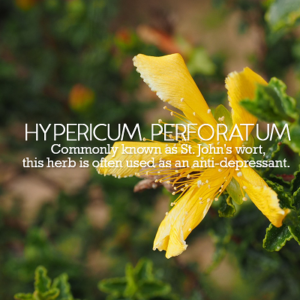 Hypericum perforatum is a botanical plant commonly known as St. John’s wort. It is mostly marketed under the name “Hypericum” and has been widely used as an herbal remedy for hundreds of years.
Hypericum perforatum is a botanical plant commonly known as St. John’s wort. It is mostly marketed under the name “Hypericum” and has been widely used as an herbal remedy for hundreds of years.
Today, Hypericum perforatum is mainly used and known for its anti-depressant properties. Despite all the medicinal qualities attributed to St. John’s wort, it is only recently that studies and experiments have been conducted to prove the efficacy of hypericum in treating disorders and ailments. The extensive studies and research has validated the claimed medicinal properties of hypericum.
The research shows it has antibacterial and antiviral properties, so it is also an effective herbal remedy for some bacterial and viral infections.
For example, it helped dissolve bacterially-infused boils and tumors. It can also be used for treating lung ailments caused by bacteria. It acts as an expectorant, and helps the body get rid of phlegm caused by infections.
Hypericin and Hyperforin
St John’s wort has quite a few active ingredients, two of the main ones being hypericin and hyperforin. Hyperforin is known for its antibacterial properties, while hypericin is an antibiotic.
Natural Anti-Depressant
As an anti-depressant, St. John’s wort’s effectiveness occurs quickly when compared to many prescribed anti-depressants. It also has fewer side-effects, which is why it is so popular.
If you are taking any prescribed medications, do not self-administer St John’s wort as they may not interact well together.
How it works for easing depression symptoms:
St. John’s wort targets the chemical processes of the brain, similar to that of (selective serotonin reuptake inhibitors) SSRI medications, such as Zoloft and Prozac.
Other Health Benefits
Hypericum is also known for treating wounds, due to its antibacterial and healing properties. It helps ease pain caused by injuries, and is helpful in relieving radiating pain, irritation and hypersensitivity. Others have used Hypericum to treat vertigo, convulsions and spinal injuries.
When used as a topical treatment it can be applied to sensitive skin. Hypericum is used for treating diarrhea and bladder problems, and recommended for those with a bedwetting problem.
The ancient Greeks and Romans used this plant to treat arthritis, menstrual cramps and ulcers. They also used this herbal plant to treat the wounds of their soldiers and psychotic symptoms.
Healthy Heart Function
Hypericum helps purify the blood from toxins and free radicals. It has been used for treating hemorrhage or internal bleeding, and promotes the healthy functioning of the heart and blood vessels. Another heart benefit is the lowering of high blood pressure.
Nerve Injuries
Conditions that involve nerve injury and muscle twitches have been treated by using St. John’s wort. It can relieve the radiating pain to other parts of the body resulting from tailbone injuries.
Dentists may use hypericum before and after surgery for nerve pain.
Due to the varied medicinal attributes of Hypericum perforatum, it is considered a powerful, effective herbal remedy among medical practitioners. It treats many conditions, and although it may have some side effects, it doesn’t have the negative side effects many mainstream drugs do.
If people experience any side effects, the common ones being a dry mouth, difficulty sleeping and stomach discomfort, speak to your health care professional, as they will more than likely reduce your dose to a comfortable and tolerable level.






